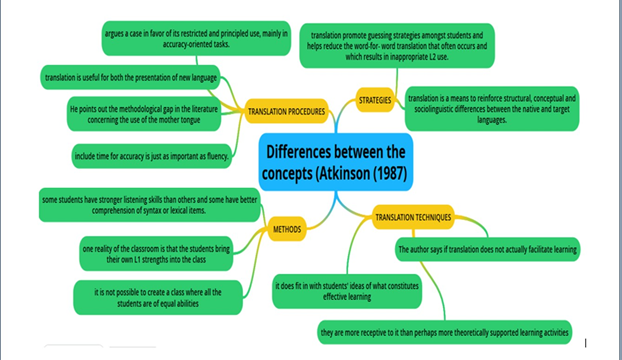Essay Monica Garzón
ESSAY
Translation was a very
popular teaching-learning strategy in the period of GrammarTranslation , after
which it fell into decline when the Direct Method appeared, its followers found
it inadequate and even counterproductive, and its decay continued until the
emergence of the Communicative Approach, but later authors such as Duff (1989),
Hurtado Albir (2001) or lavault (1985), who made the translation
reborn again and they have supported the idea of incorporating mother tongue
(MT) as a usefull tool in the learning of a (FL) Foreign Language,
Now I will refer especially
to Duff's statements, who identify three essential purposes of translation and
an activity in language learning: accuracy, clarity and flexibility. I have
argues that "trains the learner to search (flexibility) for the most
appropriate words (accuracy) to convey what is meant (clarity).
I believe that the
translation of our mother tongue into a foreign language or vice versa is very
important for our acquisition of the foreign language, it is essential to know
the meaning of each word with its different meanings, such as this exemplo;
Country: country, countryside, region, village, national, rural, neighborhood,
etc. to achieve an accuracy in the translation of the source text.
When the student is in
contact with the language through the translation has the possibility to
clearly identify the different grammatical categories according to the function
of the word in the context, an example of this is the word can, as a verb;
Power, know, can, as a noun; Can, boat, jar. That is to say the translation is
a powerful tool, through it students develop abilities to acquire and identify
vocabulary, to achieve the flexibility in the translations in the cases in
which the values of the meanings do not find an equivalent in the context of
the mother tongue
The translation allows to
identify the pragmatic use of the language and to give an adequate meaning to
the idiomatic expressions, idioms or sayings of the foreign language in the
process of acquisition.
In particular, this theme
reminds me of the translations I had made in the time of schoolgirl to the
literary works in English language of the writer Charles Dickens, like in Great
Expectations, when my level of English was still very basic, did not exist the
internet and I used a very specialized dictionary, I remember the example
expressed in this book with the expression: "brought me up 'by hand.'
Pip narrates: My sister, Mrs. Joe Gargery, was more
than twenty years older than I, and had established a great reputation with
herself and the neighbours because she had brought me up 'by hand.'
"Brought up by
hand" means that he was bottle or spoon-fed rather than nursed by his
mother or by a wet-nurse.
With the previous example
you need a context and a complete bilingual dictionary to be able to understand
exactly what their true meaning is, without the use of these tools the
translation would be inaccurate and thanks to the work of the translation of
this book I could understand that we must give a semantic sense appropriate to
each English language text that we read or work on.
When the student does not
present a good level of English with the work of the translation they can
understand that there are complex levels of English and can infer grammatical
rules that exist in the foreign language because they are different in their
mother tongue, with the translation the students can to develop short- and
long-term memory as an example of the meaning of the expression "brought
me up 'by hand, " discovered by me " many years ago and still
remembers my memory
In conclusion, the
translation does not hinder the process of acquiring a language, on the
contrary, the translation reinforces the simple and complex grammatical
structures of the English language and is a magnificent tool for all language
skills, it is a perfect combination with other strategies of Teaching and learning to reinforce knowledge and skills in
English.
Translation makes it
possible to work memorization, so important in acquiring a foreign language to
remember words, expressions and colloquial uses of the foreign language,
translation with the help of the traditional dictionary has been relegated to
the background partly by the use of translators of the Internet that displace
the real and fruitful work that the students must do for themselves.



Comentarios
Publicar un comentario